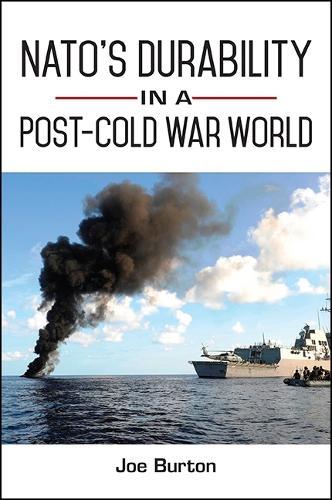Overview
Why is it that despite the end of the Cold War and the almost constant controversies surrounding the alliance's role in the world, the North Atlantic Treaty Organization (NATO) is still a prominent and vital player in international security? Joe Burton provides an in-depth analysis of NATO's changing role in the post–Cold War era and its ability to survive, adapt, and meet the needs of its members in an increasingly turbulent, globalized security environment. He offers a historically and theoretically informed account of NATO that isolates the core dynamics that have held the alliance together in troubled times. In particular, he examines a series of processes and events—from the 1990 Gulf War to the rise of the Islamic State—that help explain NATO's continuing relevance.
Full Product Details
Author: Joe Burton
Publisher: State University of New York Press
Imprint: State University of New York Press
Dimensions:
Width: 15.20cm
, Height: 2.50cm
, Length: 22.90cm
Weight: 0.227kg
ISBN: 9781438468723
ISBN 10: 1438468725
Pages: 294
Publication Date: 02 January 2019
Audience:
General/trade
,
General
Format: Paperback
Publisher's Status: Active
Availability: Available To Order

We have confirmation that this item is in stock with the supplier. It will be ordered in for you and dispatched immediately.
Reviews
Why is it that despite the end of the Cold War and the almost constant controversies surrounding the alliance's role in the world, the North Atlantic Treaty Organization (NATO) is still a prominent and vital player in international security? Joe Burton provides an in-depth analysis of NATO's changing role in the post-Cold War era and its ability to survive, adapt, and meet the needs of its members in an increasingly turbulent, globalized security environment. He offers a historically and theoretically informed account of NATO that isolates the core dynamics that have held the alliance together in troubled times. In particular, he examines a series of processes and events-from the 1990 Gulf War to the rise of the Islamic State-that help explain NATO's continuing relevance.
NATO's Durability in a Post-Cold War World traces a wide array of issues in the alliance's recent history, exploring how both liberal and realist narratives have been used to explain policies from intervening in the former Yugoslavia to the ISAF mission in Afghanistan. Joe Burton raises fascinating questions about how NATO has-and continues to-justify its existence. - H-Net Reviews (H-War) Burton expertly crafts the narrative of NATO in this text. The analysis is both accurate and interesting to read ... His effort to create a `historical narrative' approach has great value. It engages the audience in the story of NATO, and broadens the scope of investigation to include the very real impact of individuals and of historical memory. - International Journal on World Peace This book does an excellent job of chronicling key events that have led to NATO's ongoing presence in international relations as a key provider of global security. - Ryan C. Hendrickson, author of Diplomacy and War at NATO: The Secretary General and Military Action after the Cold War
Burton expertly crafts the narrative of NATO in this text. The analysis is both accurate and interesting to read ... His effort to create a `historical narrative' approach has great value. It engages the audience in the story of NATO, and broadens the scope of investigation to include the very real impact of individuals and of historical memory. - International Journal on World Peace This book does an excellent job of chronicling key events that have led to NATO's ongoing presence in international relations as a key provider of global security. - Ryan C. Hendrickson, author of Diplomacy and War at NATO: The Secretary General and Military Action after the Cold War
Author Information
Joe Burton is Senior Lecturer in International Relations at the University of Waikato in New Zealand and the coeditor (with James Headley and Andreas Reitzig) of Public Participation in Foreign Policy.




